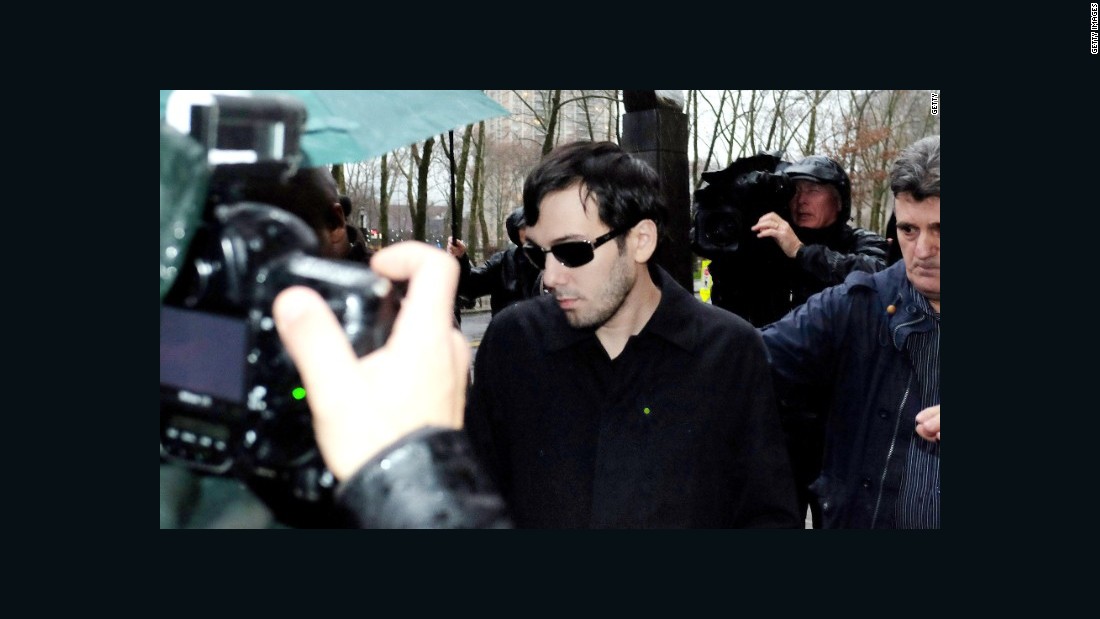
Enter Smythe, a woman who seems to have lived a pleasant life pre-Shkreli, working a high-pressure job as a white-collar crime reporter, married to a guy in finance, living in Brooklyn and raising a rescue dog. Then she covered Shkreli's case. She developed a crush, which turned into a crusade. As Clifford's story details, Smythe spent so much time defending Shkreli on Twitter that her bosses at Bloomberg had to talk to her about her social media use as it's wildly unprofessional for a journalist to engage in public relations rehab for a subject and a source (advice she disregarded).
The rest of the story layers yikes upon cringe. Smythe breaks the basic ethical codes of her profession when she manages Shkreli's personal needs, takes up his cause and gets romantically involved with him (and affirms the worst and most damaging stereotypes of female journalists along the way, even though Smythe says she never slept with him). She doesn't even bother to show up on time to a marriage-counseling appointment with her husband. They decide to divorce. She behaves so inappropriately she is pushed out of her job (though she is the one who quits).
It gets worse. Smythe defends Shkreli's behavior and says his treatment of female journalists -- which includes photoshopping himself into a romantic photo of one writer and her ex-husband, buying up the domain names of several reporters who wrote critically about him, and eventually getting suspended from Twitter for "targeted harassment" -- is mere "trolling." She positions herself as Shkreli's savior, his dedicated devotee and the one person who truly sees him -- as he manipulates her again and again, playing her against other reporters, insulting her and withdrawing communication as punishment when she doesn't do as he pleases. She freezes her eggs so that they can have children when he gets out of prison. He then apparently dumps her from his jail cell, via a statement to Elle from his lawyer in which he wishes her "the best of luck in her future endeavors."
As soon as the piece hit, the internet went nuts. As some gleefully shared the sordid, soap-operatic story on Twitter, others lectured the sharers about being so gleeful, arguing that Smythe was a victim of a manipulative narcissist, or that she was mentally ill and needed help, or perhaps both. Nearly everyone could agree that, at the very least, Shkreli was the true villain and Smythe needs therapy. Smythe cannonballed into the mix, responding to dozens of tweets defending both herself and Shkreli: "I realize it's hard for many people to accept that 1. Martin is not a psychopath, and 2. a woman can choose to do something with her life (which does not affect you) that you in no way approve of. But that's OK," she tweeted.
Thousands of strangers on the internet and off of it (myself included) have weighed in on the story, including the fashion-shoot photos of Smythe (in one, she is wearing a dress from a brand called The Vampire's Wife). Many are questioning Smythe's motivations, or openly speculating as to why she's made the choices she has. Is she delusional and psychologically unwell? Pathologically attention-seeking? A victim of a bad man, or an enabler of one?
But what about all of us?
There aren't any great lessons to be learned from Smythe's ordeal (other than the Maya Angelou-ism, "when someone shows you who they are, believe them"). Shkreli is widely hated, but up until now, his romantic life hasn't been subject to widespread public fascination.
Why are we so collectively enthralled by this story?
I suspect that it's the same reason we are often drawn to stories of grifters and con men, and of women who fall in love with serial killers or join cults; it's the same reason so many reporters and liberals wonder how anyone could support President Donald Trump when he lies so often and so obviously. For the majority of us who don't spend our lives lying, manipulating and defrauding others, stories of those who do -- and perhaps more specifically, stories of those who get taken in -- are psychological amulets, little shields that assure us we are protected. At various points in these stories, we can pinpoint the moments where we would have made a different choice, or seen the bad person's actions in a different light, or gone a different way. It confirms that our own agency and our own judgment defend us from harm.
It's an imperfect message about an incomplete and probably unknowable story, and certainly glides over the complexities of a great many factors that may or may not be in play here: dependence, unhealthy relationship dynamics or worse. But it does suggest some big correctives to centuries of messaging that love conquers all and good women can rehabilitate bad men. Instead, women are now hearing something a little more productive: You deserve better. Save yourself.
Note: Changes to the Full-Text RSS free service
"Opinion" - Google News
December 23, 2020 at 09:23AM
https://ift.tt/2KRKvet
Opinion: What the obsession with the reporter and Martin Shkreli says about us - CNN
"Opinion" - Google News
https://ift.tt/2FkSo6m
Shoes Man Tutorial
Pos News Update
Meme Update
Korean Entertainment News
Japan News Update
No comments:
Post a Comment